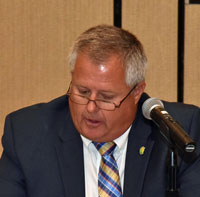**Updated story.
 Chippewa Valley Ethanol Company (CVEC), a cooperative located in Benson, Minnesota, is celebrating its 20th anniversary today. The ethanol facility began production in 1996 producing 50 million-gallons-per-year of ethanol. Today the cooperative has grown to 975 owners and has ownership interest in four other ethanol companies: Guardian Janesville, Guardian Lima, Guardian Hankinson and Frontline BioEnergy LLC — and is a founding owner of Renewable Products Marketing Group. In addition to producing fuel ethanol, CVEC also operates an industrial alcohol company, Glacial Grain Spirits, which makes certified organic alcohol products and Prairie Spirits Vodka. CVEC hosted a luncheon and presentation for its shareholders, employees and industry partners today and also gave tours of its ethanol plant for community members.
Chippewa Valley Ethanol Company (CVEC), a cooperative located in Benson, Minnesota, is celebrating its 20th anniversary today. The ethanol facility began production in 1996 producing 50 million-gallons-per-year of ethanol. Today the cooperative has grown to 975 owners and has ownership interest in four other ethanol companies: Guardian Janesville, Guardian Lima, Guardian Hankinson and Frontline BioEnergy LLC — and is a founding owner of Renewable Products Marketing Group. In addition to producing fuel ethanol, CVEC also operates an industrial alcohol company, Glacial Grain Spirits, which makes certified organic alcohol products and Prairie Spirits Vodka. CVEC hosted a luncheon and presentation for its shareholders, employees and industry partners today and also gave tours of its ethanol plant for community members.
“CVEC has been in the ethanol industry 20 years supporting rural America, providing jobs, supporting a clean environment and returning capital and infrastructure to the rural community,” said Chad Friese, CEO of CVEC. “Our 20-year anniversary celebration is an opportunity to share our appreciation for the support we have had over the last 20 years with everyone that has been part of CVEC’s continuing success.”
CVEC is a long-time member company of the Renewable Fuels Association (RFA). “CVEC has always been a leader, within the industry and the RFA,” said RFA President and CEO Bob Dinneen. “It was one of the first farmer-owned cooperatives to commit to ethanol production well before the ethanol market was fully established. CVEC’s Board shared a vision of value-added agriculture and local economic growth that became a model for others to follow. The company has always been ahead of the curve — adopting new more efficient energy technologies and courageously pursuing new market opportunities like distilled spirits. CVEC was also among the first to begin selling E85 directly to marketers. Over the years, CVEC employees have had important leadership roles within the RFA, including previously chairing RFA’s Technical Committee and former CVEC General Manager Bill Lee chairing the association in 2004–2005. The whole industry has benefited from CVEC’s vision. I congratulate them for these 20 years, and I look forward to the innovations they have in store for us over the next 20!”
 The ethanol plant is also a member of the Minnesota Bio-Fuels Association. “For 20 years, CVEC has played an active role in reducing prices at the pump, giving consumers access to cleaner fuels and reducing our nation’s dependency on foreign oil,” said Tim Rudnicki, executive director at the Minnesota Bio-Fuels Association.
The ethanol plant is also a member of the Minnesota Bio-Fuels Association. “For 20 years, CVEC has played an active role in reducing prices at the pump, giving consumers access to cleaner fuels and reducing our nation’s dependency on foreign oil,” said Tim Rudnicki, executive director at the Minnesota Bio-Fuels Association.
Dale Tolifson, a director at CVEC and CVAC, noted, “The main reason we started the ethanol plant was to add value to our corn, because in West Central Minnesota, our prices were very low. The ethanol plant not only gave us better prices, but it created jobs and put money back into the area with dividends.”
Friese added, “With 975 local members of the cooperative, an amazing and dedicated staff, and great support from our local communities and area farmers, CVEC is very proud to be able to continue these efforts for the next 20 years and beyond.
 “Biofuels aid national security by reducing our nation’s foreign energy dependence and contributing to our Administration’s broader climate goals. The recurring attempts to quietly neutralize biofuels through the defense appropriations process are disappointing,” said NFU President Roger Johnson. “I am hopeful this provision will be successfully removed in further negotiations over the bill.”
“Biofuels aid national security by reducing our nation’s foreign energy dependence and contributing to our Administration’s broader climate goals. The recurring attempts to quietly neutralize biofuels through the defense appropriations process are disappointing,” said NFU President Roger Johnson. “I am hopeful this provision will be successfully removed in further negotiations over the bill.”












